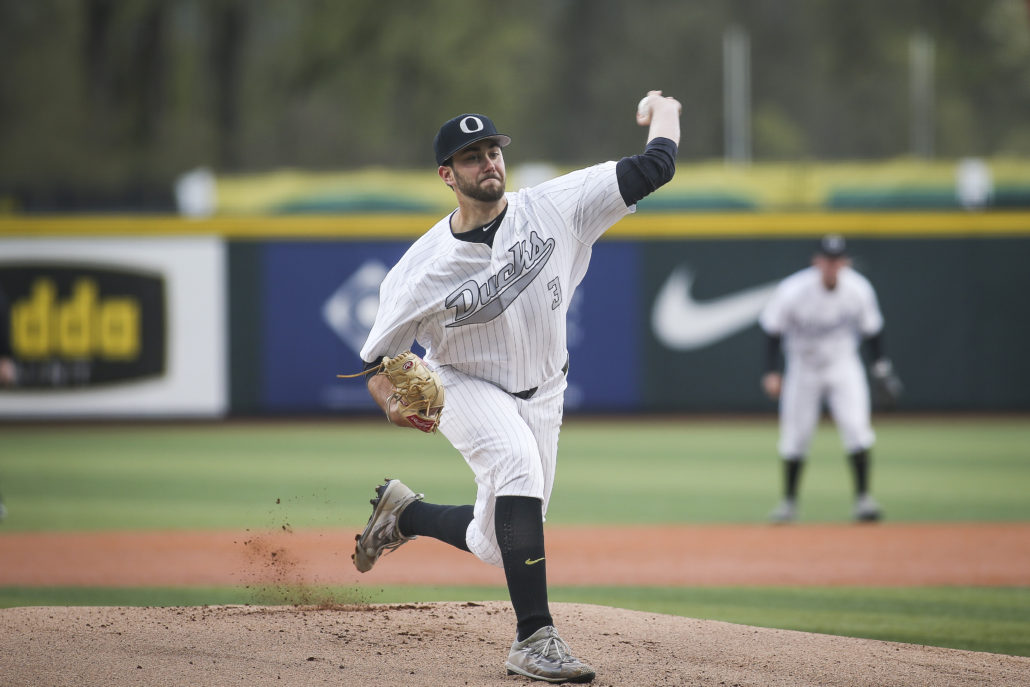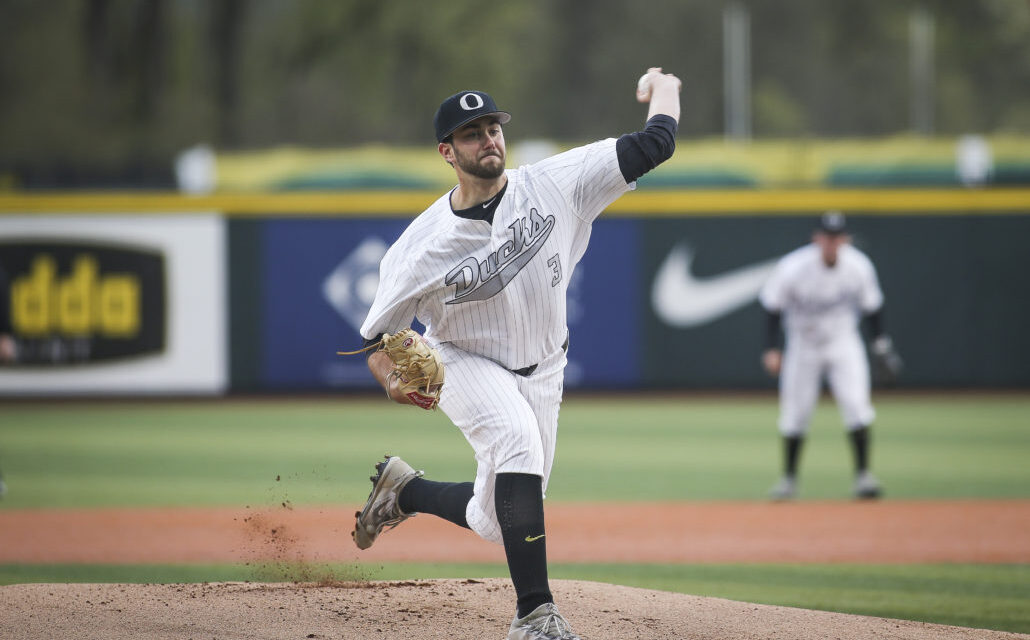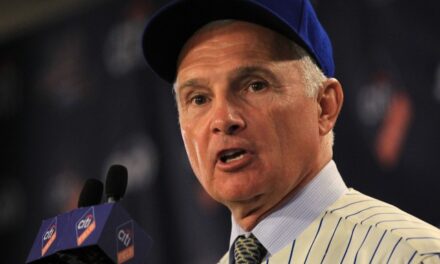
(Samuel Marshall/Eric Evans Photography)
The Mets used the No. 20 pick in the 2017 MLB Draft last month on University of Oregon Ducks standout southpaw, David Peterson.
Peterson, 21, was initially taken in the 28th round by the Boston Red Sox back in 2014, but the lefty decided to go to college and three years later, established himself as a first rounder.
As a freshman at U of Oregon, Peterson pitched to an underwhelming 4-6 record with a 4.39 ERA and a 8.89 K/9 in 12 games started.
For his sophomore season, nothing too drastic changed and his control still suffered. Peterson registered 61 strikeouts in 74 1/3 innings pitched with a 4-5 record, but in his junior year this past season, everything clicked.
Peterson dominated with an 11-4 record and 2.51 ERA, 140 strikeouts in 100 1/3 innings pitched, a 1.03 WHIP and an intimidating 12.56 K/9 and only 15 walks. Yes, for the entire season.
“Oregon lefty David Peterson punched out 140 batters and walked just 15 this year in a dominant season that took him into consideration in the teens, maybe the edges of the top ten, and the Mets have to be pumped to get him at pick 20 given his performance and huge ground ball rate,” said Keith Law of ESPN.com.
Standing at 6’6″ and 240 pounds, the left-hander possesses a 94 mph fastball and a mid-80s slider that he mixes in nicely to get the results he did in his junior year.
Taylor Blake Ward of Scout.com had the following to say about Peterson:
“The southpaw likes to work inside on lefties with his fastball, allowing the run and sink to break back into the zone, jamming hitters or making them stare at strikes on the inner half.”
“Working from a low 3/4 arm slot, Peterson has shown good movement on all his pitches, with his fastball being the best of his trio. His best off-speed offering is his above-average low 80’s changeup that he works against both righties and lefties. He works in a big-breaking curveball with a dipping break that he’s shown a feel for, but still needs to be refined.”
I had the pleasure of talking to David recently about the feeling of being selected by the Mets in the first round of this year’s MLB Draft.
Rob Piersall: Hey, David! How’s it going today?
David Peterson: Doing well.
Rob: Congratulations on being selected in the first round, that’s a fantastic feat.
Peterson: Yeah, thank you. I’m very excited.
Rob: Give me a rundown of what that day was like leading up to you being selected.
Peterson: So I woke up in the morning and tried to keep it as normal of a day as possible. I went to breakfast with my family and tried to keep my mind off it as much as I could and then I got ready and had a draft party with my family and friends.
I didn’t really hear much until probably pick No. 10. I started to hear some stuff, just kind of back and forth, kind of “you never know” stuff.
But then I got a call at the 18th pick that Detroit was going to pass and the Mets were looking to take me at No. 20.
We had some more dialogue and then the pick happened. I had a good feeling it was going to happen, but I didn’t know 100 percent until it did though.
Rob: So you found out at No. 18 that the Mets were seriously interested in picking you like you said, did you before the draft or earlier that day hear any rumblings or have a feeling that you could end up being chosen by New York?
Peterson: I talked with them and met with the area scout and they had shown interest so I knew they were interested, but it seemed like a lot of people had me falling between picks 16-18, most likely with the Mariners and that didn’t happen.
So I knew they had some interest but I think they thought maybe I wasn’t going to get there. Just by the mock draft, I didn’t know where I was going to go, but it looked like that “teen” range.
Rob: I know that Keith Law was saying that the Mets should feel very happy that they were able to get you at No. 20 because prior to the draft you were pegged to be in the teens and even borderline Top 10. So kind of going off that, what is the feeling in joining a Mets team that has prided itself on pitching the last several years?
Peterson: I think it’s huge. I love that they take pride in their pitching and they have shown they can produce some really good big league starters and that’s my ultimate goal, to make an impact in someone’s rotation and have a lengthy career at the major league level.
I don’t think anyone grows up dreaming of being a minor league baseball player. It’s an important stepping stone for development, but I think it’s awesome they have established big league pitching and that their starting rotation has been pretty strong and I’m really excited to see what the future holds
Rob: So what was it like going out there this season striking out 17 batters in one game, then going back out and fanning 20 more batters in another?
Peterson: It’s pretty indescribable, honestly, because I didn’t know how many strikeouts I had in either of those instances. I mean, it felt like I was striking a lot of guys out, but I didn’t know the exact number.
In both games I felt like I was pitching pretty well and doing a really good job of controlling hitters and getting guys out, so finding out after how many guys I struck out the first then second time was an incredible feeling.
It’s definitely an accomplishment I’ve never had before.
Rob: When did you learn that you had made Team USA and what was that experience like?
Peterson: I learned at some point last spring, I believe the middle of last spring. Coach Horton (University of Oregon, head coach) came up to me and told me that I would be joining him and Coach Karraker (University of Oregon, volunteer assistant coach) on a team.
Going through my freshman year on Team USA was an incredible experience. I wasn’t there the whole time, but with the time that I had I loved it.
That was definitely where I wanted to be again was with all my team and to travel internationally wearing those three letters across my chest and really take pride in it.
It was an amazing feeling to know I had made the team again.
Rob: You were originally selected out of high school by the Boston Red Sox in the 28th round of the 2014 draft, but you decided to go to Oregon instead. What was the decision process like in forgoing that and choosing to go to college instead?
Peterson: I broke my leg senior year of high school, so I believe that definitely hurt my draft stock.
It came down to what was being offered by the Red Sox wasn’t enough in my mind to skip the opportunities I had at Oregon.
At some point, I want to finish my degree, so all the things that came into it, it looked to me that going to Oregon and getting a head start on my degree and getting three years of development under Coach Horton was the best option, and I think it was.
Rob: Your velocity was up a little at the end of the college season as you were touching 93-94 mph with a lot of movement on your pitches, did you make any changes in your mechanics to see that uptick in your velocity?
Peterson: All year, I believe I was between 90-92 and touching 93-94 in games, but Coach Dietrich (University of Oregon, assistant coach) and I had talked about throwing more four-seams, mixing those in, and using those to complement the two-seams.
I think I had two different looks at my fastball. I think the four-seam was a little firmer and the two-seam had more movement.
So, yeah. I think it just had naturally good jumping velocity. There was nothing I did to try and throw harder.
Rob: Now I’m going to ask you to give yourself a little bit of a scouting report. What are things you are most proud of and are most comfortable with in your game, and oppositely, what are some things you look to improve on as you begin your professional career?
Peterson: I think my strikeout-to-walk ratio this year. Not necessarily the strikeouts, but the walks more importantly and keeping free bases down was huge.
I think when you give guys free bases and you let them get on base, you allow more runs to score. I think the key to my success was the control I had in not walking guys and really pounding the strike zone.
When you get ahead of hitters and put the pressure on them, and when you get up 0-2 or 1-2, you can have some fun with them.
Rob: When you’re on the mound, have you modeled yourself after anyone? Is there anyone that you see yourself replicating when you’re on the hill yourself?
Peterson: No, not necessarily. I don’t think there’s anybody I really model my game after, but I do pay attention and read stuff on the best guys like Syndergaard and deGrom as well as Bumgarner on the West Coast.
I mean, all these guys are the best in the game and there’s a lot to learn from them and how they go about their business when they’re out on the field, so I pay attention to what the best guys are doing, but I don’t really model myself after anyone.
Rob: Your head coach at Oregon compared you to both Clayton Kershaw and Madison Bumgarner after one of your starts. Do those kind of expectations make you put more pressure on yourself or do they not really get to you?
Peterson: No, not at all. I want to be the best that I possibly can be and to be mentioned in the same sentence right now as those guys is a huge honor and a huge compliment, so I take it as a stepping stone in my development being compared to those guys, and in the future just as good, if not better than those guys.
Rob: Who were some of your favorite players growing up watching?
Peterson: I think my favorite player is probably Derek Jeter. Guys like him and Ken Griffey, Jr. A lot of position players, honestly.
I just loved watching them play and seeing how they went about their business, I think there’s a lot to learn from those guys.
Rob: You’re hopefully going to be embarking on your professional career, but what are some of the most proud moments of your amateur years?
Peterson: I think that all the things that I’ve done, whether it’s the three years I had at Oregon or winning the state championship in high school, I’ve played with so many great guys.
My teammates in Oregon, those are my closest friends and it’s like family with some of those guys.
All the people that I’ve met, and all the memories that I have to take from those opportunities is one of the most important things to me.
Rob: Is there anything else you would like to add, whether it be from your time at Oregon to getting drafted or starting your professional career?
Peterson: One of the biggest things is how excited I am to be chosen by the Mets.
It was kind of a whirlwind of emotions when it first happened, but after having some time to let everything calm down, I’m super excited and don’t want to be with any other organization.
I’m ready to see what the future holds
Rob: Great! Well David, thank you for taking the time out to talk to me and I wish you the best of luck going forward and hopefully getting a contract signed soon.
Peterson: Yes, thank you very much. Thanks for your time.
David Peterson can be found on Twitter at @DavidPeterson.















